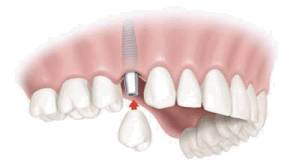 Dental implants are changing the way people live. They are designed to provide a foundation for replacement teeth which look, feel and function like natural teeth. The person who has lost teeth regains the ability to eat virtually anything, knowing that the teeth appear natural and that facial contours will be preserved.
Dental implants are changing the way people live. They are designed to provide a foundation for replacement teeth which look, feel and function like natural teeth. The person who has lost teeth regains the ability to eat virtually anything, knowing that the teeth appear natural and that facial contours will be preserved.
What are Dental Implants?
 The implants themselves are titanium posts, which are inserted into the jawbone where teeth are missing. These titanium anchors act as tooth root substitutes. They are surgically placed into the jawbone. The bone bonds with the titanium, creating a strong foundation for artificial teeth. Small posts are then attached to the implant and sit above the gums. These posts provide stable anchors for artificial replacement teeth.
The implants themselves are titanium posts, which are inserted into the jawbone where teeth are missing. These titanium anchors act as tooth root substitutes. They are surgically placed into the jawbone. The bone bonds with the titanium, creating a strong foundation for artificial teeth. Small posts are then attached to the implant and sit above the gums. These posts provide stable anchors for artificial replacement teeth.
Benefits of Dental Implants:
- Improved appearance. Dental implants look and feel like your natural teeth.
- Improved speech. Dental implants allow you to speak without the worry that teeth might slip.
- Improved comfort. Since they become part of you, implants eliminate the discomfort of removable dentures.
- Easier eating. Dental implants function like natural teeth, allowing you to eat your favorite foods with confidence and without pain.
- Improved self-esteem. Dental implants can restore your smile and help you feel great.
- Improved oral health. More of your own teeth are left intact, improving long-term oral health. Individual implants also allow easier access between teeth, improving oral hygiene.
- Durability. With good care, many implants last a lifetime.
The Surgical Procedure
For most patients, the placement of dental implants involves two surgical procedures. If a non-restorable tooth needs to be extracted, it is removed and a bone graft will be placed. After three to four months of healing, the implants are placed within your jawbone. For the next three to six months following surgery, the implants are beneath the surface of the gums gradually bonding with the jawbone. You should be able to wear a temporary replacement tooth or denture in the area and should eat a soft diet during this time.
After the implant has bonded to the jawbone, the second phase begins. Our doctors will uncover the implants and attach small posts, which will act as anchors for the artificial teeth. These posts sit above the gums. Impressions will be taken and crowns or dentures fabricated. Next, the artificial tooth is then placed over the post, or in the case of a denture, the denture can be placed over a few implant posts. The entire procedure usually takes six to eight months.
Are you a candidate for implants?
If you are considering implants, your mouth must be examined thoroughly and your medical and dental history reviewed. If you mouth is not ideal for implants, ways of improving outcome, such as bone grafting, may be recommended.
Surgical Advancements
Using the most recent advances in dental implant technology, our doctors are able to place single stage implants. These implants require a minimum of three to four months of healing time before artificial teeth are placed. There are even situations where the implants can be placed at the same time as a tooth extraction – further minimizing the number of surgical procedures. Advances in dental implant technology have made it possible, in select cases, to extract teeth and place implants with crowns at one visit. This procedure, called “immediate loading,” greatly simplifies the surgical process.
